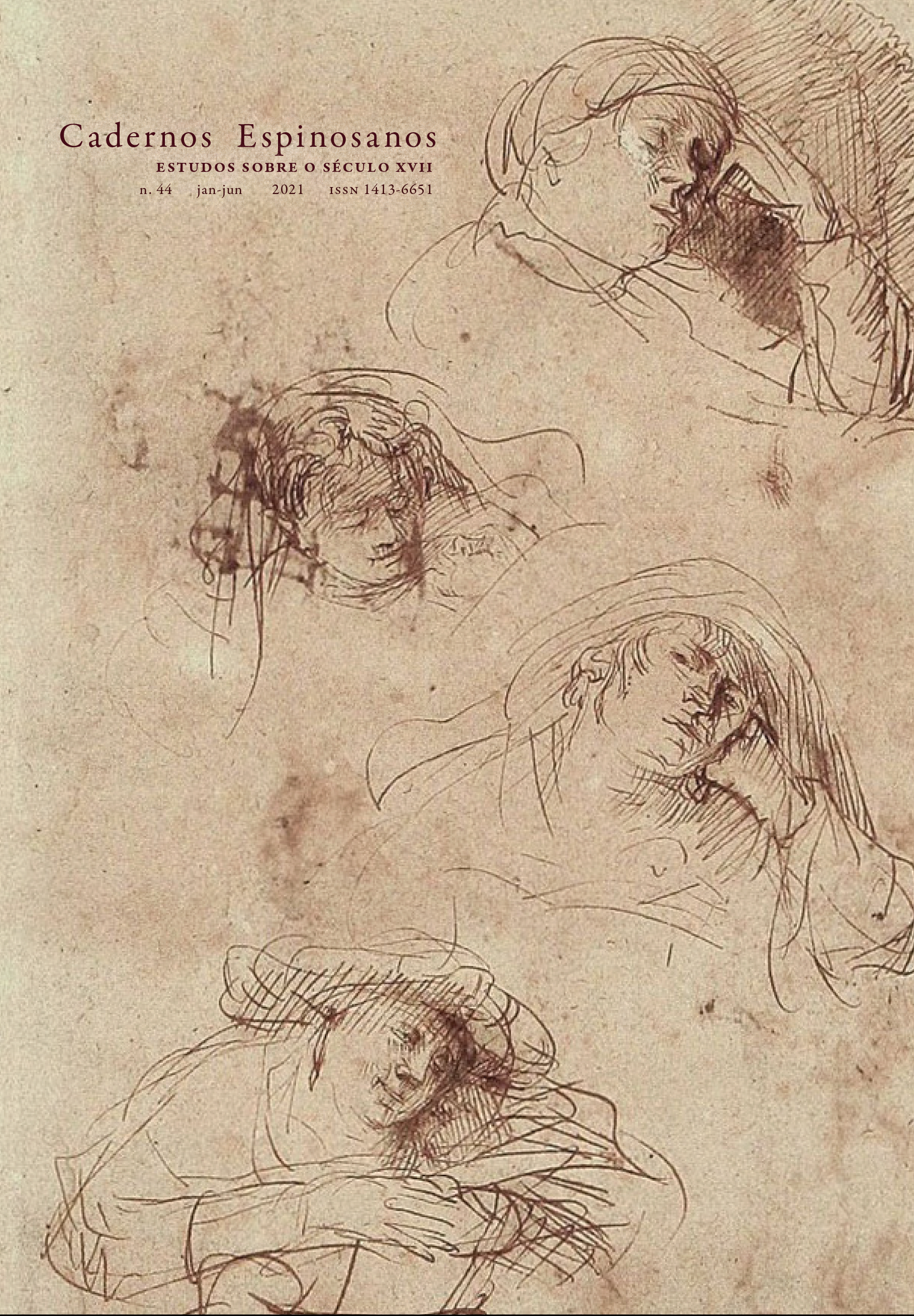Descartes and a possible politics: the analysis of the man of experience
DOI:
https://doi.org/10.11606/issn.2447-9012.espinosa.2021.181017Keywords:
Descartes, Politics, Affection, Subject, ManAbstract
The authors of Descartes’ Readings divide the Cartesian production by associating subjects with texts, that is, the parts of the “tree of knowledge” with his works. If we agree with the division, we will also agree that Descartes did not write a specific work on politics. But this does not mean that we cannot find in this philosopher reflections on the relationship that men (and not just substances) establish among themselves. Thus, to think “politics” in Descartes is to see that man is treated on the basis of “substantial union”, as a man of experience full of passions and affections. The purpose of this article is to illustrate the hypothesis that either through the project of reaching the truths in philosophy or through the “affectivity” it is not possible to consider the Cartesian subject as isolated, which is contrary to a reductionism of the Cartesian theory to the purely thinking subject of the second meditation.
Downloads
References
ALQUIÉ, F. (1987). Galileu, Descartes e o Mecanismo. Lisboa: Gradiva.
BUZON, F.; CASSAN, É.; KAMBOUCHNER, D. (2015). Lectures de Descartes. Paris: Ellipses.
CARDOSO, A. ; FERREIRA, M. L. R. (org.). (2001). Medicina dos afectos: Correspondência entre Descartes e a Princesa Elisabeth da Boémia. Oeira: Celta editora.
DESCARTES, R. (1973). Correspondência; Meditações Metafísicas; Discurso do método; As paixões da alma. In: Os Pensadores. Trad de Bento Prado Jr., Jacó Guinsburg. São Paulo: Abril Cultural.
DESCARTES, R. (1989). Regras para a direção do espírito. Trad. Port. de João Gama. Lisboa: Edições 70.
DESCARTES, R. (2003). Carta-prefácio dos Princípios da Filosofia. Apresentação e Notas: Denis Moreau; Trad. Homero Santiago. São Paulo: Martins Fontes.
DESCARTES, R. (1987). Discours de la Méthode. Texte et commentaire par Étienne Gilson. 6ed. Paris: Vrin.
DESCARTES, R. (1897-1910). OEuvres de Descartes. Adam et Tannery (Ed.). 12 vol. Paris: Léopold Cerf Imprimeur-Éditeur.
GUENANCIA, P. (2012). Descartes et l’ordre politique. Paris : Gallimard.
MARQUES, J. (1993). Descartes e sua concepção de homem. Com uma tradução do Tratado do Homem. São Paulo, Loyola.
MARQUES, J. (2000). “A correspondência com a Princesa Elisabeth e a fundamentação da moral cartesiana”, In: Revista Discurso (usp), São Paulo, n. 31, pp. 383-398.
OLIVA, L.C. (2008). “Apontamentos sobre a moral em Descartes”, In: Bioethikós (Centro Universitário São Camilo), São Paulo, vol. 2, pp. 163- 176.
RODIS-LEWIS, G. (1998). La morale de Descartes. Paris : Quadrige/ Presses Universitaires de France.
SOUZA, A.(2013). Tese: Descartes- O cortesão exilado: política e paixão. USP, 2013. Retirado de: https://teses.usp.br/teses/disponiveis/8/8133/tde-20032015124418/publico/2013_AlexandreDeOliveiraSouza_VOrig. pdf.
TEIXEIRA, L. (1990) Ensaio sobre a moral de Descartes. São Paulo: Brasiliense.
Downloads
Published
Issue
Section
License
Copyright (c) 2021 Beatriz Laporta

This work is licensed under a Creative Commons Attribution-NonCommercial-ShareAlike 4.0 International License.
Autores que publicam nesta revista concordam com os seguintes termos:
- Autores mantém os direitos autorais e concedem à revista o direito de primeira publicação, com o trabalho simultaneamente licenciado sob a Licença Creative Commons Attribution que permite o compartilhamento do trabalho com reconhecimento da autoria e publicação inicial nesta revista.
- Autores têm autorização para assumir contratos adicionais separadamente, para distribuição não-exclusiva da versão do trabalho publicada nesta revista (ex.: publicar em repositório institucional ou como capítulo de livro), com reconhecimento de autoria e publicação inicial nesta revista.
Authors who publish in this journal agree to the following terms:
b. Authors are authorized to take on additional contracts separately, to non-exclusive distribution of the article published in this journal (ex.: to publish in institutional repository or as part of a book), with an acknowledgment of its initial publication in this journal.
How to Cite
Funding data
-
Fundação de Amparo à Pesquisa do Estado de São Paulo
Grant numbers 2019_04830-4


